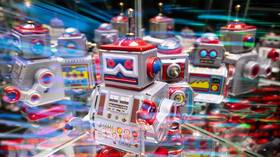Governments can do nothing to stop technology from destroying labor, tech entrepreneur tells Keiser Report

In this episode of Keiser Report’s annual Summer Solutions series, Max and Stacy talk about the role technology plays in causing the deflation that may lead to an abundant future, if the gains are shared.
They are joined by tech entrepreneur Jeff Booth, who’s the author of ‘The Price of Tomorrow: Why Deflation is the Key to an Abundant Future.’
“Transitioning from an inflationary world to a deflationary world, people should be scared,” he says, adding, “There’s going to be a disruption and that disruption is coming no matter what.”
According to Booth, “There’s nothing fundamental that governments can do to stop the rate of technology progress. And if you just ask about what technology does – it’s supposed to remove labor.”
All companies use technology to reduce labor and they use it to provide abundance, the tech expert says. “And what’s happening is that you have technology moving at an exponential pace, driving prices down, and governments all around the world caught in an inflationary trap that they created themselves out of the monetary policy, fighting against that force.”
Booth says that he then asks himself, “Isn’t it good when the value of your money goes up and prices go down, like for you personally?” He explains that people then “could work less time and the abundance of technology would be broadly distributed instead of being concentrated, like it is today.”
For more stories on economy & finance visit RT's business section














